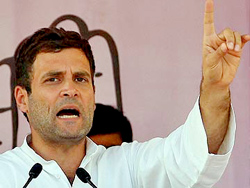New Delhi, Jan 27: Rahul Gandhi today hit the campaign trail in Delhi, accusing Prime Minister Narendra Modi of resorting to "personal PR" without delivering anything concrete in eight months and favouring only a few industrialists.
Holding his first roadshow for the February 7 Assembly polls, the Congress Vice President expressed confidence that the party will stage a comeback here.
"NDA is in power at the centre since May but the Prime Minister is busy in his personal PR (Public Relations). Not a single concrete thing has taken place. The public is asking when will the talks get over and real work would begin.
"There has been favouritism and work of only 3-4 industrialists is being done. Those who are poor, who are needy are being neglected," he told reporters after the road show in the Kalkaji constituency here.
The Congress Vice President was also dismissive of the Aam Aadmi Party which had made a spectacular debut in the last assembly polls trouncing his party.
Gandhi toured Kalkaji and adjoining areas in an open vehicle accompanied by Congress campaign committee chief Ajay Maken, DPCC chief Arvinder Singh, local candidate Subhash Chopra and Sharmishta Mukherjee, Congress candidate from GK constituency.
"Congress is a party for the poor people. We will stage a comeback and will hold the hands of the poor and bring the country on the right track," Gandhi said.
He said his party will fight the February 7 Assembly polls on three key issues -- to provide electricity and water at the lowest possible rate, regularisation of temporary and contractual employees and to extend right to shelter to the poor on the lines MNREGA and RTI.
"We will give water and electricity at the lowest possible rates, give permanent jobs to contractual workers and give right to shelter," he said






Comments
Add new comment